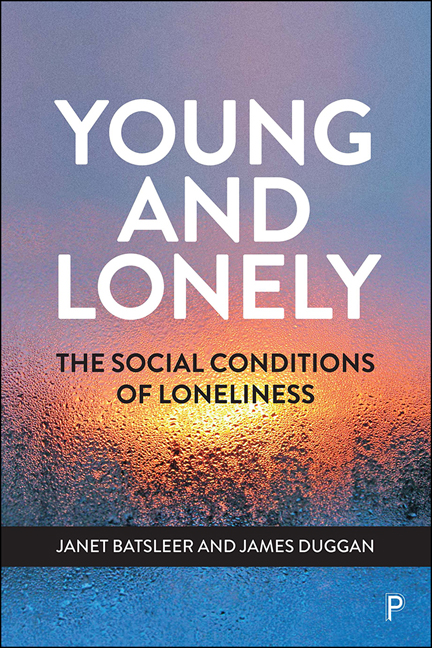Book contents
- Frontmatter
- Contents
- Notes on the Authors
- Acknowledgements
- Preface
- 1 Animate, Attune, Amplify
- 2 Finding Oneself a Loneliness Agenda
- 3 I’M New Here: Creating a New Research Project and A Young Person Led Research Agenda
- Part I The Social Conditions of Loneliness
- Part II The Experience of Loneliness
- Part III Building Friendship and Connection
- References
- Index
7 - Transitions
Published online by Cambridge University Press: 18 March 2021
- Frontmatter
- Contents
- Notes on the Authors
- Acknowledgements
- Preface
- 1 Animate, Attune, Amplify
- 2 Finding Oneself a Loneliness Agenda
- 3 I’M New Here: Creating a New Research Project and A Young Person Led Research Agenda
- Part I The Social Conditions of Loneliness
- Part II The Experience of Loneliness
- Part III Building Friendship and Connection
- References
- Index
Summary
Youth loneliness and transition
‘My sister's about to start at secondary school. I hope she makes some friends.’ (Manchester researcher)
‘You can't keep running to mummy and daddy.’ (Young person, Norwich)
Changing schools, passing and failing exams, going to college, starting work, moving out from a childhood home, breaking up with a first girlfriend or boyfriend – all of these are considered by sociologists and social psychologists as routine moments in the lives of young people. They are considered to be moments of ‘normative loneliness’. Times when, it might be said, loneliness is only to be expected. They are moments sometimes marked by rituals and rites of passage, which in themselves may be occasions of acute loneliness: a results day, a school prom, ‘the keys to the door’, stag and hen parties. In this chapter, we explore these everyday moments of potential loneliness in the lives of young people.
Moments of transition throughout the lifecourse have clearly been recognised by social psychologists as moments of potential loneliness, and in other studies times such as retirement, children leaving home and leaving work for a period of maternity leave, as well as bereavement and becoming a widow or widower, have been given as examples of such transitions (Perlman and Peplau, 1981; Qualter et al, 2015). The time of transition is a time of change, when some aspects of experience can be let go of and responses to experience can be reconfigured.
‘Youth’ as a life stage has been routinely analysed by sociologists as the period of transition between childhood and adulthood. In contemporary neoliberal conditions, this transition is recognised as an extended period, often continuing well into the twenties. This is also discussed in terms such as ‘broken’ or ‘complex’ transitions, which refer to young people's difficulties in movement into adult roles and to this happening at a comparatively young age. Independence of income, housing and the formation of adult relationships, including the raising of a family, are the key markers of adult status. In conditions of austerity in the UK, it is very evident that achieving adult status is harder and harder for young people. In the UK currently, a million more 21–30-year-olds live at home with their parents than did a decade ago (Mohdin, 2019).
- Type
- Chapter
- Information
- Young and LonelyThe Social Conditions of Loneliness, pp. 73 - 84Publisher: Bristol University PressPrint publication year: 2020

